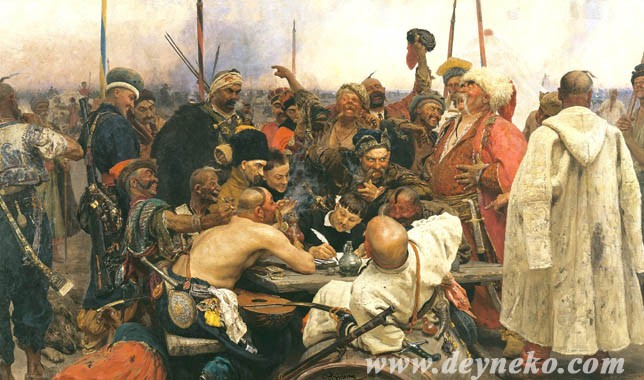This family name has ukranian origin. In its origin there is word which explain social status. Deyneka – ukranian cossack [1] XVII with a club (weaponed). Other explanation: deynekies are haidamakas [2]– insurgency in South and West Ukraine in XIV-XV [3]. Additionally there is an information, that in Zaporozhskoy sechi were big (or strong) men with a big club for cavalry and infantry suppression. These “big men” were called – deynekies.
We more believe in first explanation – it is more clear for us. Also our grand grand father has came with his brother from Ukraine to Kuban (Sladkiy, Labinskiy rayon, Krasnodarskiy kray). This fact additionally confirms that family name deyneko has ukranian origin.
1 – Cossacks (Slavic: Козакъ, Kozak; Ukrainian: Козаки́, Kozaky;Russian: Казаки́, Kazaki; Polish: Kozacy) are a group of predominantly East Slavic people who originally were members of military communities in Ukraine and Southern Russia inhabiting sparsely populated areas and islands in the lower Dnieper[1] and Don basins and who played an important role in the historical development of those nations. They continue to exist in Russia, Ukraine and other post-Soviet states. Their origins are disputed. [more detailed here]

2 – The haidamakas (deyneki), also haidamaky or haidamaks (singular haidamaka, Ukrainian: Гайдамаки, Haidamaky, from Turkish haydamak, “to pursue”), were paramilitary bands in 18th-century Ukraine. The haidamak movement was formed mostly of local Cossacks and peasantry (kozaky and holota), against the Polish nobility in right-bank Ukraine. The movement was not limited to the right bank only, and occasionally deteriorated to common robbery and murder, for example in the so-called Matsapura case in the Left Bank in 1734. The equivalent to haidamaka is opryshok in Ukrainian Galicia, and hajduk in the Balkans. Hajduk is also used in Polish language.[more detailed here]